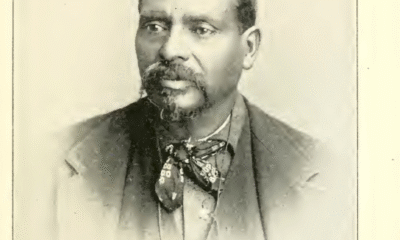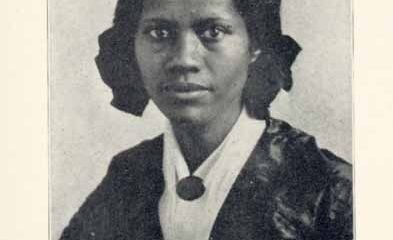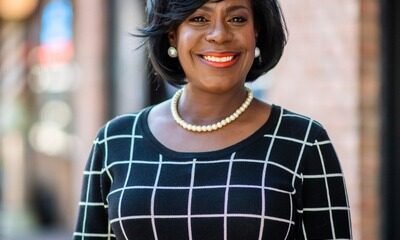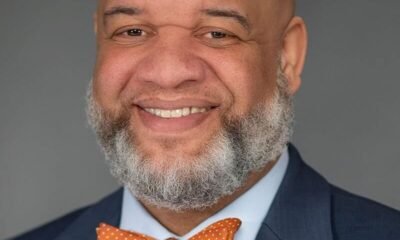News
Drop Box for Babies: Conservatives Promote a Way to Give Up Newborns Anonymously
Published
4 years agoon
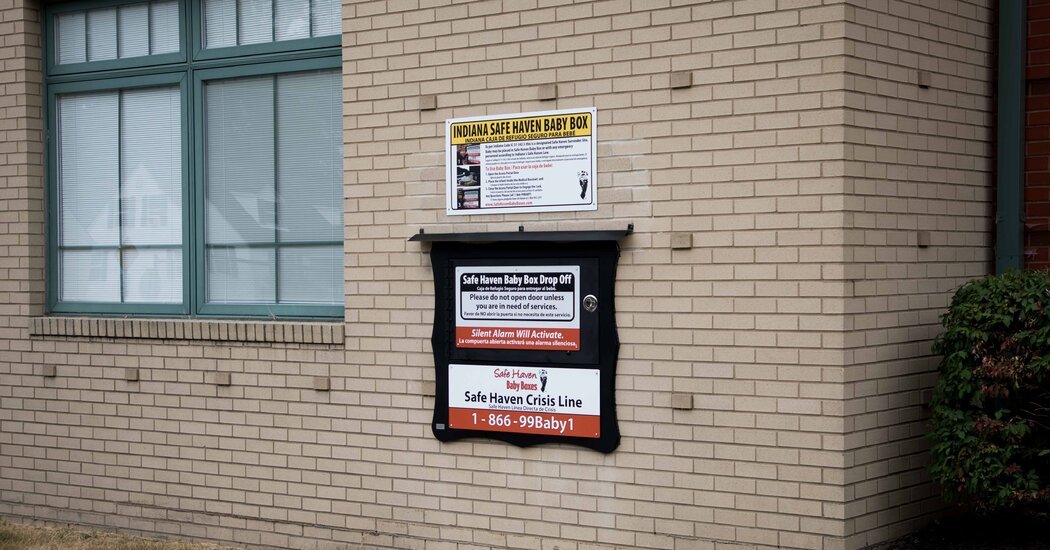
The Safe Haven Baby Box at a firehouse in Carmel, Ind., looked like a library book drop. It had been available for three years for anyone who wanted to surrender a baby anonymously.
No one had ever used it, though, until early April. When its alarm went off, Victor Andres, a firefighter, opened the box and found, to his disbelief, a newborn boy wrapped in towels.
The discovery made the local TV news, which praised the courage of the mother, calling it “a time for celebration.” Later that month, Mr. Andres pulled another newborn, a girl, from the box. In May, a third baby appeared. By summer, three more infants were left at baby box locations throughout the state.
The baby boxes are part of the safe haven movement, which has long been closely tied to anti-abortion activism. Safe havens offer desperate mothers a way to surrender their newborns anonymously for adoption, and, advocates say, avoid hurting, abandoning or even killing them. The havens can be boxes, which allow parents to avoid speaking to anyone or even being seen when surrendering their babies. More traditionally, the havens are locations such as hospitals and fire stations, where staff members are trained to accept a face-to-face handoff from a parent in crisis.
All 50 states have safe haven laws meant to protect surrendering mothers from criminal charges. The first, known as the “Baby Moses” law, was passed in Texas in 1999, after a number of women abandoned infants in trash cans or dumpsters. But what began as a way to prevent the most extreme cases of child abuse has become a broader phenomenon, supported especially among the religious right, which heavily promotes adoption as an alternative to abortion.
Over the past five years, more than 12 states have passed laws allowing baby boxes or expanding safe haven options in other ways. And safe haven surrenders, experts in reproductive health and child welfare say, are likely to become more common after the Supreme Court’s decision to overturn Roe v. Wade.
During oral arguments in the case Dobbs v. Jackson Women’s Health Organization, Justice Amy Coney Barrett suggested that safe haven laws offered an alternative to abortion by allowing women to avoid “the burdens of parenting.” In the court’s decision, Justice Samuel A. Alito Jr. cited safe haven laws as a “modern development” that, in the majority’s view, obviated the need for abortion rights.
But for many experts in adoption and women’s health, safe havens are hardly a panacea.
To them, a safe haven surrender is a sign that a woman fell through the cracks of existing systems. They may have concealed their pregnancies and given birth without prenatal care, or they may suffer from domestic violence, drug addiction, homelessness or mental illness.
The adoptions themselves could also be problematic, with women potentially unaware that they are terminating parental rights, and children left with little information about their origins.
More Coverage of the Kansas Abortion Vote
If a parent is using a safe haven, “there’s been a crisis and the system has already in some way failed,” said Ryan Hanlon, president of the National Council for Adoption.
Boosting the Movement
Save haven surrenders are still rare. The National Safe Haven Alliance estimates that 115 legal surrenders took place in 2021. In recent years, there have been over 100,000 domestic adoptions annually, and more than 600,000 abortions. Studies show that the vast majority of women denied an abortion are uninterested in adoption and go on to raise their children.
But the safe haven movement has become much more prominent, in part because of a boost from a charismatic activist with roots in anti-abortion activism, Monica Kelsey, founder of Safe Haven Baby Boxes.
With Ms. Kelsey and allies lobbying across the country, states like Indiana, Iowa and Virginia have sought to make safe haven surrenders easier, faster and more anonymous — allowing older babies to be dropped off, or allowing relinquishing parents to leave the scene without speaking to another adult or sharing any medical history.
Some who work with safe haven children are concerned about the baby boxes, in particular. There are now more than 100 across the country.
“Is this infant being surrendered without coercion?” asked Micah Orliss, director of the Safe Surrender Clinic at Children’s Hospital Los Angeles. “Is this a parent who is in a bad spot and could benefit from some time and discussion in a warm handoff experience to make their decision?”
Ms. Kelsey is a former medic and firefighter, and an adoptee who says she was abandoned at birth by her teenage mother, who had been raped.
She first encountered a baby “safe” — a concept dating back to medieval Europe — on a 2013 trip to a church in Cape Town, South Africa, where she was on a pro-abstinence speaking tour.
She returned home to Indiana to found a nonprofit, Safe Haven Baby Boxes, and installed her first baby box in 2016.
To use one of Ms. Kelsey’s boxes, a parent pulls open a metal drawer to reveal a temperature-controlled hospital bassinet. Once the baby is inside and the drawer is closed, it locks automatically; the parent cannot reopen it. An alarm is triggered and the facility’s staff members can access the bassinet. The box also sends out a 911 call. Twenty-one babies have been left in the boxes since 2017, and the average amount of time a child is inside the box is less than two minutes, Ms. Kelsey said.
She has raised money to put up dozens of billboards advertising the safe haven option. The advertisements feature a photo of a handsome firefighter cradling a newborn, and the Safe Haven Baby Box emergency hotline number.
Ms. Kelsey said she was in contact with legislators across the country who wanted to bring the boxes to their regions, and predicted that within five years, her boxes would be in all 50 states.
“We can all agree a baby should be placed in my box and not in a dumpster to die,” she said.
Because of the anonymity, there is limited information about the parents who use safe havens. But Dr. Orliss, of the Los Angeles safe haven clinic, performs psychological and developmental evaluations on some 15 such babies annually, often following them through their toddler years. His research found that more than half the children have health or developmental issues, often stemming from inadequate prenatal care. In California, unlike in Indiana, safe haven surrenders must be done face-to-face, and parents are given an optional questionnaire on medical history, which often reveals serious problems such as drug use.
Still, many children do well. Tessa Higgs, 37, a marketing manager in southern Indiana, adopted her 3-year old daughter, Nola, after the girl was dropped off at a safe haven just hours after her birth. Ms. Higgs said the biological mother had called the Safe Haven Baby Box hotline after seeing one of the group’s billboards.
“From day one, she has been so healthy and happy and thriving and exceeding all developmental milestones,” Ms. Higgs said of Nola. “She’s perfect in our eyes.”
Legal Gray Areas
For some women seeking help, the first point of contact is the Safe Haven Baby Box emergency hotline.
That hotline, and another maintained by the Safe Haven National Alliance, tell callers where and how they can legally surrender children, along with information about the traditional adoption process.
Safe haven groups say they inform callers that anonymous surrenders are a last resort, and give out information on how to keep their babies, including ways to get diapers, rent money and temporary child care.
“When a woman is given options, she will choose what’s best for her,” Ms. Kelsey said. “And if that means that in her moment of crisis she chooses a baby box, we should all support her in her decision.”
But Ms. Kelsey’s hotline does not talk about the legal time constraints for reunifying with the baby unless callers ask for it, she said.
In Indiana, which has the majority of baby boxes, state law does not specify a timeline for terminating birth parents’ rights after safe haven surrenders, or for adoption. But according to Don VanDerMoere, the prosecutor in Owen County, Ind., who has experience with infant abandonment laws in the state, biological families are free to come forward until a court terminates parental rights, which can occur 45 to 60 days after an anonymous surrender.
Because these relinquishments are anonymous, they typically lead to closed adoptions. Birth parents are unable to select the parents, and adoptees are left with little to no information about their family of origin or medical history.
Mr. Hanlon, of the National Council for Adoption, pointed to research showing that over the long term, birth parents feel more satisfied about giving up their children if biological and adoptive families maintain a relationship.
And in safe haven cases, if a mother changes her mind, she must prove to the state that she is fit.
According to Ms. Kelsey, since her operation began, two women who said they had placed their infants in boxes have tried to reclaim custody of their children. Such cases can take months or even years to resolve.
Birth mothers are also not immune from legal jeopardy, and may not be able to navigate the technicalities of each state’s safe haven law, said Lori Bruce, a medical ethicist at Yale.
While many states protect surrendering mothers from criminal prosecution if babies are healthy and unharmed, mothers in severe crisis — dealing with addiction or domestic abuse, for example — may not be protected if their newborns are in some way affected.
The idea of a traumatized, postpartum mother being able to “correctly Google the laws is slim,” Ms. Bruce said.
With the demise of Roe, “we know we are going to see more abandoned babies,” she added. “My concern is that means more prosecutors are going to be able to prosecute women for having unsafely abandoned their children — or not following the letter of the law.”
That said, the movement continues apace.
Ms. Higgs, the adoptive mother, has stayed in touch with Monica Kelsey of Safe Haven Baby Boxes. “The day that I found out about Roe vs. Wade, I texted Monica and was like, ‘Are you ready to get even busier?’”
Read the full article here
A journalist since 1994, he also founded DMGlobal Marketing & Public Relations. Glover has an extensive list of clients including corporations, non-profits, government agencies, politics, business owners, PR firms, and attorneys.

Business
My ancestors were full-blooded Indians … until the census said otherwise
Published
6 months agoon
August 17, 2025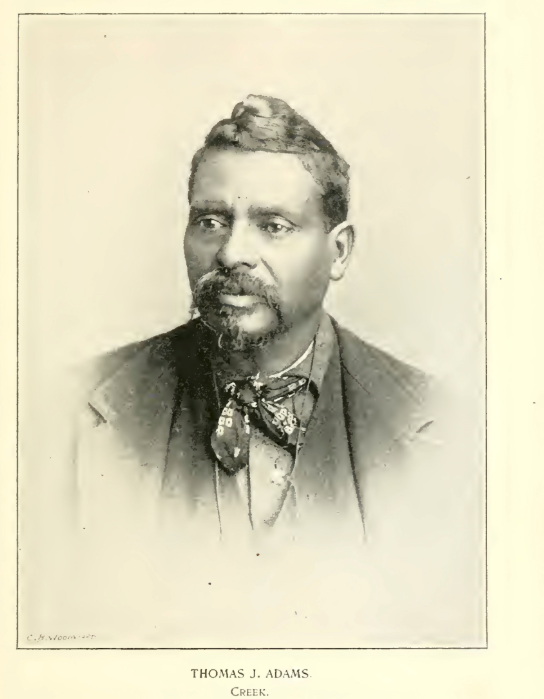
(OKLAHOMA – August 17, 2025) – When I first started researching my family’s genealogy, I thought I was just going to fill in a few blanks.
Instead, I uncovered a lie so deep, so systematic, it reshaped everything I thought I knew about who we are as a people.
I want to show you something personal.
Below, you’ll see two official U.S. government records—both documenting one of my direct ancestors. Thomas Jefferson Adams Harjo.
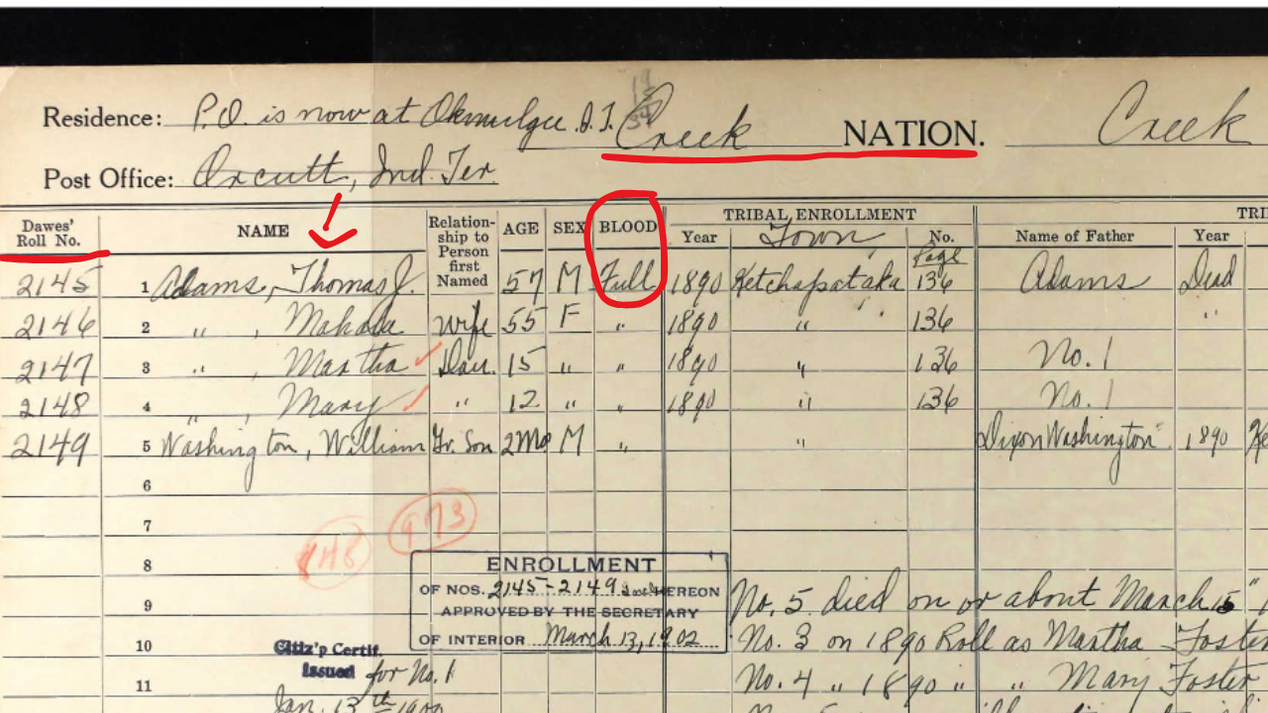
Creek Nation certificate
📜 The first is from the Dawes Roll, the federal list created in the early 1900s to register members of the Five Civilized Tribes.
As you’ll see, my ancestor is listed as a Full-Blood Indian—a clear acknowledgment of their tribal heritage and cultural identity.
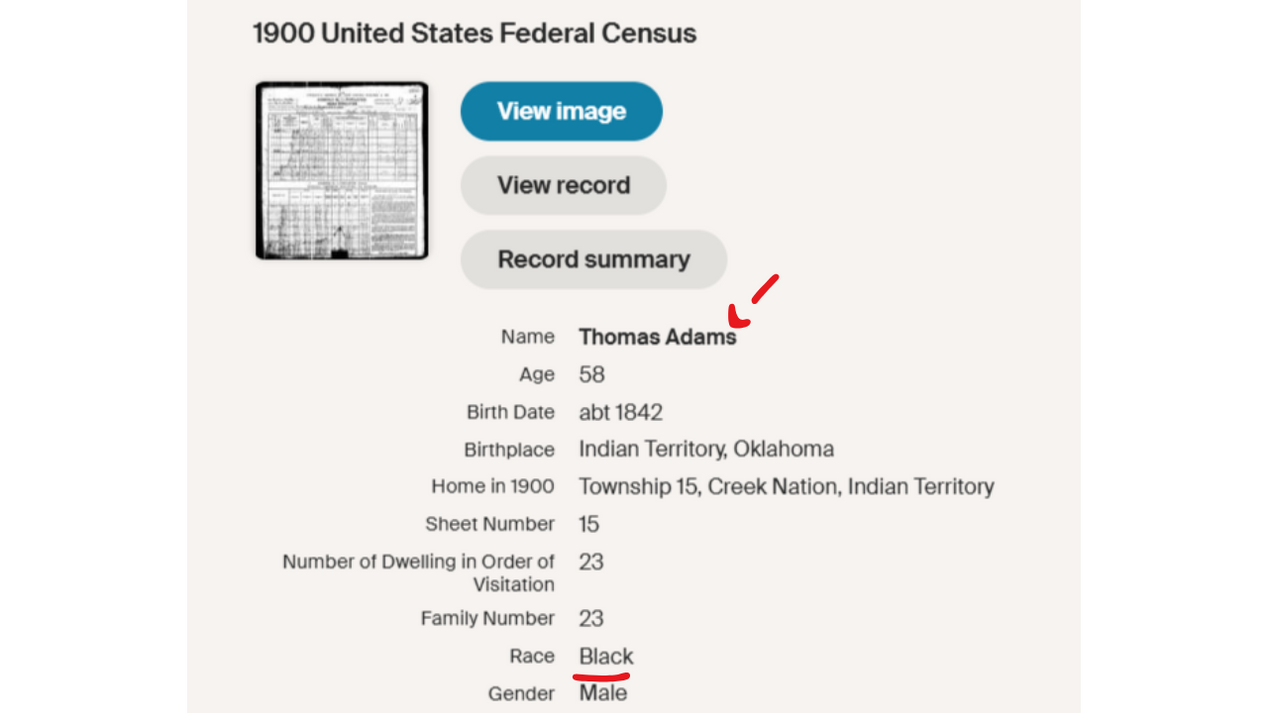
1900 US Census
But then, take a look at the second image:
📄 That’s the federal census record from just a few years later.
Same ancestor.
Same location.
But this time, the government marked them as Negro.
No tribe. No Indian classification.
Just folded into the general Black population—without consent, without explanation.
That wasn’t a mistake.
That was paper genocide.
This is what happened to millions of Indigenous Black Americans across the South.
Their identities were stripped away on paper—one document at a time—by a system designed to erase, absorb, and exploit.
This wasn’t just about racism. It was about land, power, and control.
By reclassifying tribal people as Negro or Colored, the government could:
-
Deny them land rights
-
Remove them from tribal rolls
-
Steal their inheritance
-
And make sure future generations never knew who they really were
This is why so many of our elders say, “My grandma said we had Indian in us.”
They weren’t lying.
They just didn’t have the tools to prove it.
Now we do.
And I’m not showing you this to just share my story—I’m showing you because this might be your story, too.
If you’re ready to go deeper, tomorrow I’m going to pull back the curtain on how far this went—how the reclassification of Black Indians was not an exception, but the rule across the Southeast.
You’re not crazy.
You’re not reaching.
You’re remembering.
—Mike
Founder, Native Black Ancestry
News
Voices of West Tampa: District 5 Special Election Forum, Aug. 27th
Published
6 months agoon
August 12, 2025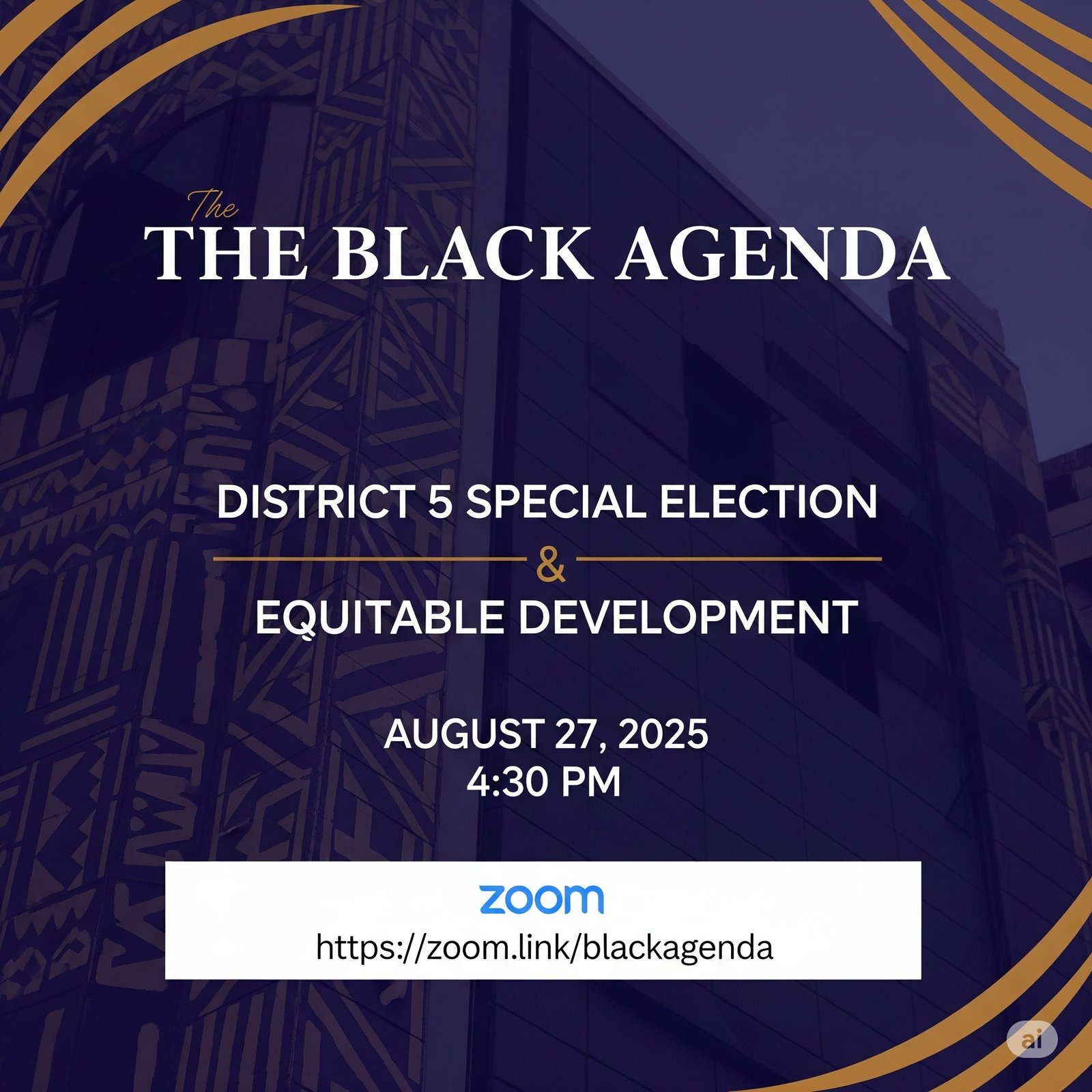
(TAMPA, FL – August 12, 2025) – The Black Agenda is coming! Join us this August for a powerful virtual town hall where residents, neighborhood associations, nonprofit leaders, faith communities, and other key stakeholders will come together to share their concerns and discuss solutions.
![]() This event will be streamed live and will feature candidates offering their vision for the future of West Tampa.
This event will be streamed live and will feature candidates offering their vision for the future of West Tampa.
This will be a street-level, bottom-up dialogue—focused on real voices, real stories, and real strategies to protect and uplift our community.
https://us02web.zoom.us/…/register/n2MwP53TQ-2e9xfih1rrAg

Join us this August for a powerful virtual town hall.
News
From Illinois to Texas, CTU President Stacy Davis Gates Leads Largest African American Parade in the Country Amid National Education and Democracy Attacks
Published
6 months agoon
August 8, 2025
(CHICAGO – August 8, 2025) – This Saturday, internationally recognized labor leader and Chicago Teachers Union President Stacy Davis Gates will serve as an Honorary Marshal at the 96th Annual Bud Billiken Parade, the largest African American parade in the United States.
Why Does This Matter?
- Back To School: As families nationwide prepare for the academic year, the Chicago Teachers Union will usher it in by continuing the call for Chicago’s 300,000+ students to have the schools they deserve.
- Texas: State-level fights over education and democracy in Illinois resonate across the nation. Illinois is currently hosting Texas Democratic leaders who are fighting shared policy battles including public education funding and labor protections.
- National Relevance: The Chicago Teachers Union is one of the most powerful teachers’ unions in the country. When America catches a cold, Chicago catches the flu, but its leaders continue to push back on attacks against equality and opportunity. It is the third-largest local teachers union in the country and the largest local union in Illinois.
“DOGE already happened in Chicago. Our public school system was ravaged by the types of policies that are being implemented at the federal level right now: summarily firing female workers, Black female workers from the schools; closing schools—Rahm Emanuel closed fifty of them.” – Stacy Davis Gates (May 2025)
________________________________________________
About Stacy Davis Gates
- A working mother and high school social studies teacher.
- Led the historic 2019 CTU strike, securing smaller class sizes, sanctuary protections for immigrant students and the right to teach Black history.
- Raised millions to elect pro-education and pro-worker candidates including Mayor Brandon Johnson and fought for equitable school funding.
- Serves as Executive Vice President of the Illinois Federation of Teachers, Vice President of the American Federation of Teachers, Party Chair of United Working Families, and board member of the Action Center on Race & the Economy (ACRE).
- Is one of the next-generation labor leaders that you are going to want to get to know. She is going to help define what union leadership looks like in the coming years.

Stacy Davis Gates

Remember Who You Are: The Indigenous Series 📱

Remember Who You Are: The Indigenous Series

Indigenous Series: Reclaiming Our Legacy 📱

Indigenous Series: Reclaiming Our Legacy

Indigenous Series: Save Our Legacy

Remember Who You Are: The Indigenous Series

Remember Who You Are: The Indigenous Series 📱

Indigenous Series: Reclaiming Our Legacy

Indigenous Series: Reclaiming Our Legacy 📱

Indigenous Series: Save Our Legacy 📱
Newsletter
Subscribe to our newsletter to get the latest news directly to your inbox.
